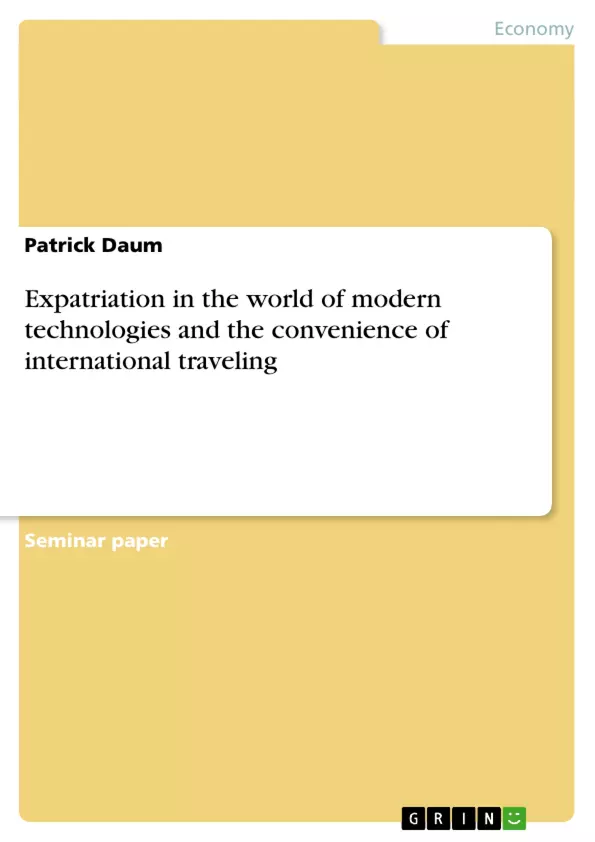Contents
1 Introduction
2 Expatriation – Discontinued Model?
2.2 Virtual Teams - Advantages
2.3 Costs
2.4 Improved Travelling Conditions
3 Expatriation - Importance in Global Economy
3.2 Virtual Teams - Disadvantages
3.3 Cultural Intelligence
3.4 Business Relationships
3.5 Investment in Human Capital
4 Conclusion
,,If globalization is seen as inexorable, then companies will need a globally mobile workforce tasked with administering their far-flung but rapidly growing operations” (cf. The Economist, 2010).
Corporate business strategies involving mergers and acquisitions, greenfield investments or international joint ventures underline the importance of acting international throughout all business activities. Consequently human resources (HR) is facing an increased need for employees willing to work abroad for a limited time period. This essay critically examines the question whether ,,with the growth on modern communication technologies, such as email and video-conferencing, and the ease of international travel, expatriates will become an extinct species.” Pros and cons will be discussed in order to weight different perspectives and provide a final conclusion.
Inhaltsverzeichnis (Table of Contents)
- Introduction
- Expatriation - Discontinued Model?
- Virtual Teams - Advantages
- Costs
- Improved Travelling Conditions
- Expatriation Importance in Global Economy
- Virtual Teams - Disadvantages
- Cultural Intelligence
- Business Relationships
- Investment in Human Capital
- Conclusion
Zielsetzung und Themenschwerpunkte (Objectives and Key Themes)
This essay examines whether the rise of modern communication technologies and ease of international travel has led to the decline of expatriation as a common business practice. It evaluates the potential advantages and disadvantages of utilizing expatriates in a globalized business environment.- The impact of modern communication technologies and international travel on expatriation
- The role of expatriates in global business strategies
- The advantages and disadvantages of utilizing virtual teams
- The importance of cultural intelligence in international business
- The costs associated with expatriation
Zusammenfassung der Kapitel (Chapter Summaries)
- The introduction establishes the context of expatriation within globalization and the increasing demand for globally mobile employees. It also defines the scope of the essay, focusing on employees moving between parent companies and foreign subsidiaries within the same firm.
- This chapter explores the potential decline of expatriation due to advancements in communication technologies and international travel. It discusses the advantages of utilizing virtual teams, including cost savings and improved communication.
- This chapter highlights the continuing importance of expatriation in global business. It explores the disadvantages of virtual teams, such as difficulty in building trust and understanding cultural nuances. It also emphasizes the crucial role of cultural intelligence and the value of personal relationships in international business.
Schlüsselwörter (Keywords)
This essay focuses on expatriation, global business, communication technologies, virtual teams, cultural intelligence, and the costs associated with international talent mobility. It explores the changing dynamics of managing a global workforce in an era characterized by advancements in technology and increasing international travel.Frequently Asked Questions
Is expatriation becoming an extinct model due to technology?
The essay examines this question, weighing the rise of virtual teams against the ongoing need for a globally mobile workforce in the global economy.
What are the advantages of virtual teams over expatriates?
Virtual teams offer significant cost savings, reduced travel time, and the ability to collaborate across borders using modern communication tools like video conferencing.
Why is "Cultural Intelligence" still vital for international business?
Cultural intelligence allows employees to navigate nuances and build trust, which is often difficult to achieve solely through digital communication.
What are the disadvantages of relying solely on virtual communication?
Disadvantages include potential misunderstandings, difficulty in building deep business relationships, and the lack of face-to-face interaction necessary for complex negotiations.
How does expatriation serve as an investment in human capital?
Working abroad develops a globally-minded leadership pool and transfers critical knowledge between parent companies and foreign subsidiaries.
- Quote paper
- Patrick Daum (Author), 2011, Expatriation in the world of modern technologies and the convenience of international traveling, Munich, GRIN Verlag, https://www.grin.com/document/193128



